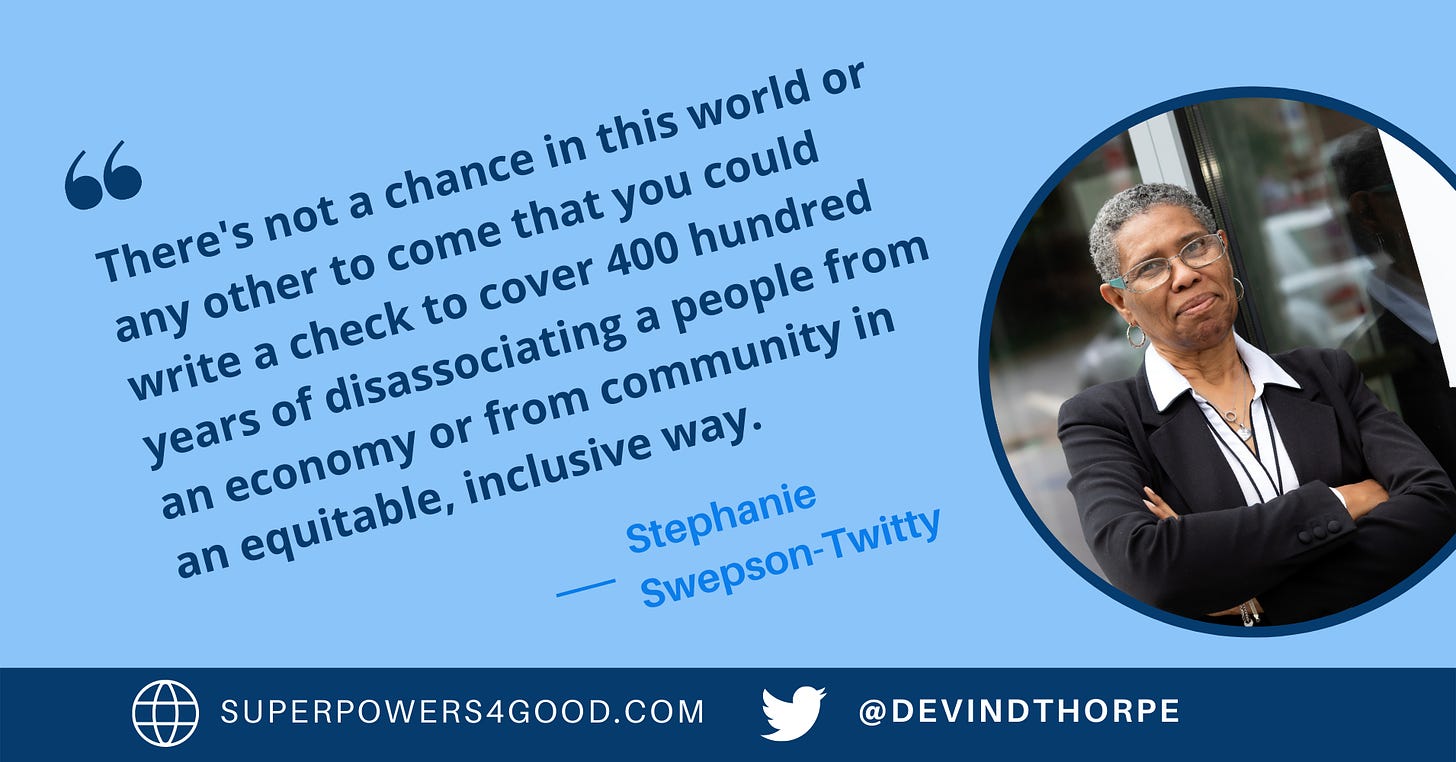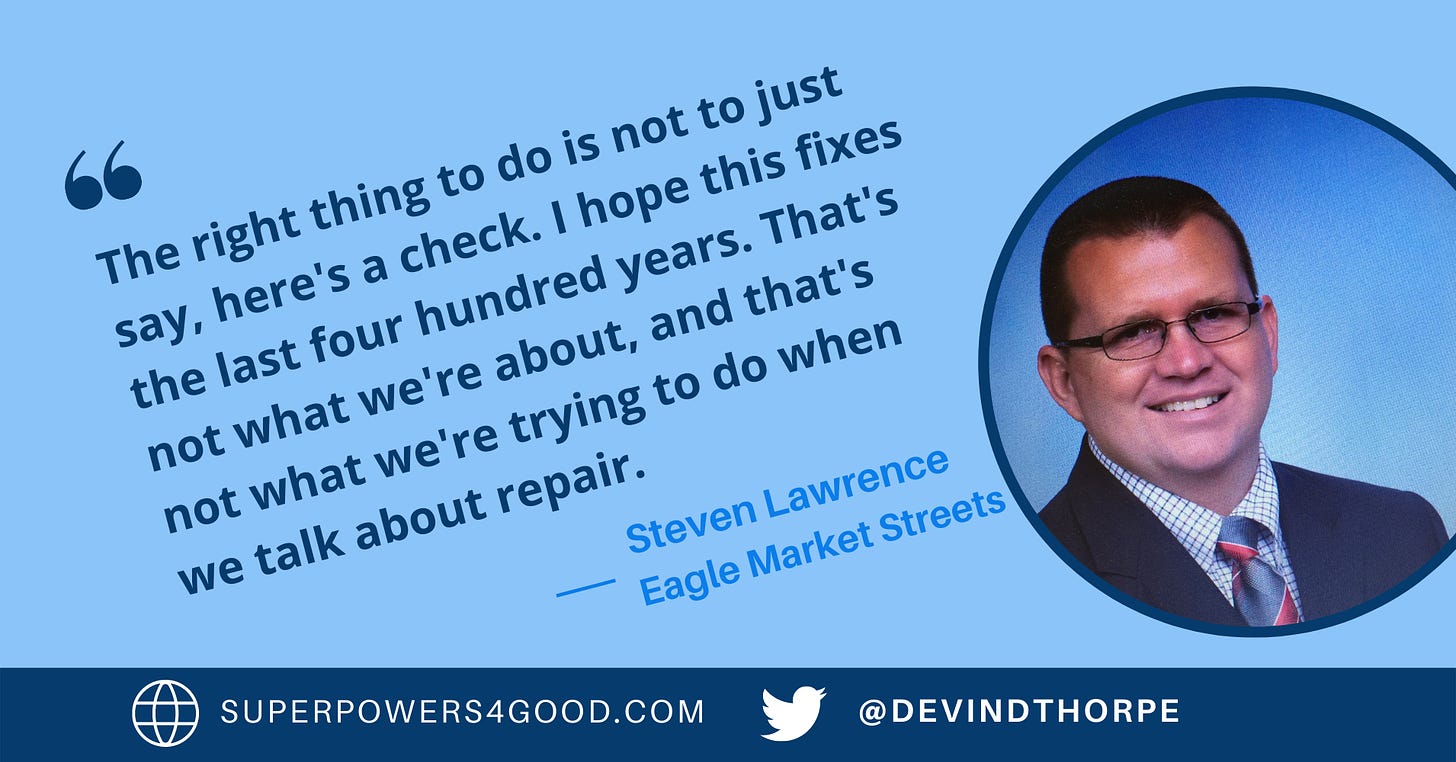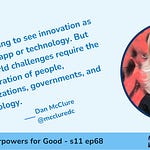Devin: Stephanie, what is your superpower?
Stephanie: I feel confident that my superpower is my ability to network and network in a way that is both for good and impactful.
Devin: Kevin, what is your superpower?
Kevin: I think over time, I’ve learned to follow strong, smart women who put things together well.
Devin: Steven. Your superpower?
Steven: I don’t give up on the folks that I’m working with. I take on challenges to be able to get them the help that they need.
These three leaders are working together to create a sustainable model for repairing the impact of over 400 years of systemic and structural disadvantages facing BIPOC communities. Stephanie Swepson-Twitty, Kevin Doyle Jones and Steven Lawrence are developing a model for a voluntary repair fund to support exploited communities.
In Asheville, North Carolina, the Vanderbilts built the Biltmore Estate, an American castle considered the largest mansion in the country. Today, it is a tourist attraction that essentially drives the local economy. Visitors come from around the world.
Not all visitors fully appreciate that following the civil war, a community of African Americans built a community called Shiloh on the property. When the Vanderbilts acquired the property, they moved the entire Shiloh community elsewhere. The community, which still exists in what some continue to call “New Shilo,” has not benefitted directly from the project since.
The idea that Stephanie developed and the trio are working to implement is to assess something resembling a voluntary sales tax in Asheville to fund ongoing support for the Shiloh community.
“The repair fund sprang out of discussions that Kevin and Steven and others of us were having around the reparations challenge that is being faced nationally,” Stephanie explains. “In our conversation, it came to me that the root word of reparations is repair.”
The goal of reparations—to correct the harm of centuries of systemic disadvantages—is one the trio supports. They intend their fund idea to be a small start that can grow to become significant in many communities.
“There’s not a chance in this world or any other to come that you could write a check to cover 400 hundred years of disassociating a people from an economy or from community in an equitable, inclusive way,” Stephanie says.
Kevin, the founder and CEO of SoCap, noted that the rising, promising entrepreneurs receiving scholarships to the conference were seldom from BIPOC communities. The problem, he saw, was that there was too little capital there to fund entrepreneurs. They can’t raise the friends and family rounds of capital. “Folks like me, when we reach out for friends and family, get money,” Kevin noted. For the past five years, he’s made this issue a top priority.
One of his challenges as a proven, experienced leader is to follow and support. “As an old straight white guy who’s been taught to lead, I’ve learned to follow.”
“Nobody comes up to a young white boy and says, ‘You know, I see a real follower in you, son,’” he adds, to make his point. “We’re acculturated to be the leaders and walk in the room and assume that we’re in charge. So, that’s been the big learning for me, learning to follow.”
Kevin notes that the funds raised will be controlled by the people they are intended to benefit. “It’s community-directed capital. So, it means that you yield power to the powerless, and you take real action on racial reconciliation.”
Stephanie and Steven lead Eagle Market Street Development Corporation Community Equity Fund. Some of the money now comes from Buncombe County, Kevin explains. The county funds the work because it helps job creation.
“Ninety plus percent of black-owned businesses are sole proprietors,” Kevin says. “We said, look, judge us on how many jobs are created by these sole proprietors and with the increase in income and with the increase in revenue.”
It worked. “They can actually say that they’re their $750,000 actually is creating jobs.”
“We’re offering [funds to] small BIPOC businesses who’ve been in operation for three to five years, who are trending in annual revenues at $100,000 or not less than $50,000 and who have the capacity to scale themselves by becoming job creators or gaining a greater share of the market so they can be job creators,” Stephanie explains, suggesting that the new fund could be used similarly.
“It’s going to be really dependent, I think, on the particular local community and what those displacements may have been,” Steven adds.
“The right thing to do is not to just say, ‘Here’s a check. I hope this fixes the last four hundred years.’ That’s not what we’re about, and that’s not what we’re trying to do when we talk about repair,” Steven says.
All three are using their superpowers, networking, following women and not giving up on people to make this plan a reality. This small but scalable pilot could lead the way to transformative impact on communities that have been disadvantaged for centuries. This effort will be worth following in the coming years.

























This New Model for Reparations Could Be Transformative